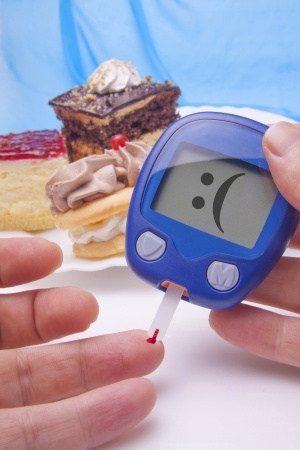How To Lower Blood Sugar
How to lower blood sugar by paying attention to four critical elements: Diet, Exercise, Sleep, and Green Living. Not only will you experience blood glucose benefits from following these recommendations, you will experience overall health benefits as well.
How to Lower Blood Sugar with Diet
The healthiest and most effective way to lower your blood sugar is by changing your diet. Carbohydrates in your diet are responsible for raising your blood sugar. The simplest way to lower your blood sugar is to reduce your carbohydrate intake. How much? Well, that depends on a variety of factors. The fact is that adopting very low carbohydrate limits as recommended by Dr Atkins (20 grams a day) or Dr. Bernstein (6 grams for breakfast and snacks, 12 grams for lunch and dinner) will control your blood sugar very nicely. You will also likely experience significant weigh loss despite eating a lot of low carbohydrate food and your food cravings will disappear within two weeks.

In order to curb food cravings and to stimulate immediate weight loss and blood sugar stabilization, we feel that leveraging a low carbohydrate diet like the one recommended by Dr. Bernstein is essential to building your confidence and getting you started right. After following a low carbohydrate diet for a period of time, you may want to branch out a bit and experiment with exactly how many carbohydrates your body can tolerate without spiking your blood sugar. When this happens we suggest that you start testing your blood sugar multiple times after meals (30 minutes, 1 hour, 1-1/2 hours, 2 hours, 3 hours, 4 hours) to determine how much carbohydrate your body can handle. The goal is to keep your post meal blood sugars under 140 mg/dl. Jenny Ruhl’s book Blood Sugar 101: What They Don't Tell You About Diabetes provides a wealth of tips as well as proven strategies for adopting a low carbohydrate diet and successfully lowering your blood sugar without driving yourself crazy.
How to Lower Blood Sugar with Exercise
Exercise lowers your blood sugar by increasing your overall insulin sensitivity. It increases the insulin sensitivity of your muscles both while you exercise and for a few hours after wards. It also builds more muscle, which in turn, allows you to burn off more glucose while you are resting.
Here’s how to lower your blood sugar with exercise. When starting an exercise routine, it is important not to overdo it. Give your body time to adjust to exercise, especially if you have been sedentary for years. Find a body friendly exercise that you enjoy like walking, swimming, playing golf, dancing or yoga. If your favorite exercise is mainly cardiovascular, try to incorporate some resistance exercises into your routine. This doesn’t mean you have to join a gym and start pumping iron, you can use your own body weight and do squats, sit-ups, push-ups, pull ups and the like while you are out on an evening walk. Mark Sisson provides some wonderful tips for exercising in his book The Primal Blueprint.
One important thing to know when it comes to starting out with a new exercise routine is that people who have high blood sugars for a period of time are prone to develop tendon problems. Likely this is because high blood sugars cause tendons to become brittle. There is also some evidence that even slightly elevated blood sugars cause abnormal thickening of tendons. Therefore, if you lift weights or decide to take up yoga, be gentle to avoid damaging your tendons.
One last word on exercise; many studies show that half an hour of brisk walking five times a week will provide all the physiological benefits of exercise without damaging your joints. So at the very least, consider getting a pedometer to see how many steps you are taking a day. Setting a goal to get 10,000 steps in per day will provide you with many health benefits as well as help you to lower your blood sugar.
How to Lower Your Blood Sugar by Sleeping More
It may sound counter intuitive, but getting more sleep is essential to lowering your blood sugar levels. Stress raises your blood sugar because stress hormones make you more insulin resistant for hours after you experience them. Sleep lowers your stress levels.
In addition to getting more sleep, it also pays to improve the quality of your sleep. A 2012 study found that disrupted sleep patterns combined with sleep deprivation (5.6 hours per night) raised blood sugar levels significantly both after fasting and immediately after meals. It turned out that this wasn’t due to insulin resistance, but caused by decreased insulin production.
How to Lower Blood Sugar by Avoiding Exposure to Toxic Chemicals
Many toxic chemicals have been linked to insulin resistance and impaired insulin secretion. Some of the most important chemicals to avoid include pesticides, PCB’s and herbicides (like Atrazine) which all cause insulin resistance. Arsenic both from industrial coal burning or copper smelting impairs insulin secretion in beta cells.
In addition, the following chemicals detected in human bloodstreams have all been linked to insulin resistance:
- Nonstick compounds used in cooking pans
- Chemicals used to make upholstery fabric stain resistant
- Flame retardants
- Phthalate plasticizers found in food and cosmetic containers
- BPA found in hard plastics
Not only do these chemicals cause endocrine disruption, obesity and insulin resistance, but they can persist in your body for years once they get into your bloodstream. The Environmental Working Group's website is a wonderful source of information regarding the chemicals present in our environment.
Many prescription drugs also raze blood sugar levels and cause diabetes. The highly respected Women’s Health Initiative Study, for example found that women without diabetes who were taking statins at the start of the 15 year study had almost twice the risk of developing diabetes as those who were not. Other drugs also known to cause diabetes in people who would not otherwise get it include:
- Prednisone
- Beta Blockers
- Atypical antipsychotic drugs like Zyprexa and Abilify
- SSRI depressants (antidepressants)
Lastly many cancer treatments, especially radiation treatment greatly increase the risk of diabetes.
Lowering Your Blood Sugar is a Participation Sport
Taking care of your body and managing your health is a participation sport. The extent to which we can truly experience life is greatly influenced by how well our physical body is working. For some reason, the entire human race sometimes seems to have lost touch with this fact. Instead, our culture focuses on how much it can extract from the body, and people often develop a love/hate relationship with their body. Certainly in many industrialized countries like the United States, kids are raised to be sensitive to how they look. Competitive sports aside, very little focus is placed on how well their body actually works. From a very young age, people are eating a diet lacking in real nutrition. At the same time, sleep deprivation is the norm, exercise is viewed as a necessary evil and it impossible to completely avoid regular chemical exposure. Our suggestions for how to lower blood sugar are provided in the spirit of helping you to care for yourself.
More Information
References
How to lower blood sugar with diet
- Dr. Bernstein’s Diabetes Solution: The Complete Guide to Achieving Normal Blood Sugars, Third Ed., Richard K. Bernstein. Little Brown, New York, 2007, ISBN 978-0316167161.
- Blood Sugar 101: What They Don't Tell You About Diabetes By Jenny Ruhl Published by Technion Books Copyright 2008, 2012 Janet Ruhl.
How to lower blood sugar with sleep
- Adverse Metabolic Consequences in Humans of Prolonged Sleep Restriction Combined with Circadian Disruption. Orfeu M. Buxton et al. Sci Transl Med 11 April 2012: Vol. 4, Issue 129, p. 129ra43
How to lower blood sugar by increasing exercise
- Exercise Effects of Exercise on Glycemic Control and Body Mass in Type 2 Diabetes Mellitus: A Meta-analysis of Controlled Clinical Trials. Boulé N G et al. JAMA. 2001;286:1218-1227.
- Intensity and Amount of Physical Activity in Relation to Insulin Sensitivity: The Insulin Resistance Atherosclerosis Study. Elizabeth J. Mayer-Davis et al. JAMA. 1998;279:669-674.
- Gulliford, M. Diabetes Care, August 2006; vol 29: pp 1929-1930. Reuters.http://www.webmd.com/pain-management/carpal-tunnel/news/20060822/carpal-tunnel-predict-diabetes
- Thickness of the Supraspinatus and Biceps Tendons in Diabetic Patients. Mujde Akturk et al. Diabetes Care 25:408, 2002
- Using Pedometers to Increase Physical Activity and Improve Health: A Systematic Review. Dena M. Bravata, MD et. al. JAMA 2007;298(19):2296-2304
How to lower blood sugar by reducing chemical exposure:
- Chronic Exposure to the Herbicide, Atrazine, Causes Mitochondrial Dysfunction and Insulin Resistance. Soo Lim et al. PLoS ONE Published 13 Apr 2009
- Arsenic Exposure and Prevalence of Type 2 Diabetes in US Adults. Ana Navas-Acien et al. JAMA. 2008;300(7):814-822.
- The Estrogenic Effect of Bisphenol-A Disrupts the Pancreatic b-Cell Function In Vivo and Induces Insulin Resistance. Alonso-Magdalena et al. Environmental Health Perspectives 113(January):106-112
- Diabetes in Relation to Serum Levels of Polychlorinated Biphenyls and Chlorinated Pesticides in Adult Native Americans. Neculai Codru et al. Environ Health Perspect.
- Statin Use and Risk of Diabetes Mellitus in Postmenopausal Women in the Women's Health Initiative. Annie L. Culver et al. Arch Intern Med. 2012;172(2):144-152. doi:10.1001/archinternmed.2011.625
- A Meta-Analysis of 94,492 Patients With Hypertension Treated With Beta Blockers to Determine the Risk of New-Onset Diabetes Mellitus. Sripal Bangalore , Sanobar Parkar , Ehud Grossman , Franz H Messerli. Am J Cardiol. 2007 Oct 15;100 (8):1254-1262 17920367
- Antidepressant Use Associated with Increased Type 2 Diabetes Risk. Caroline Cassels. Medscape.com. Report on research paper presented at 2007 ADA convention. http://www.medscape.com/viewarticle/539078



New! Facebook Comments
What do you think? Share your thoughts below...